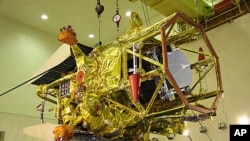Russia's space agency says cosmic radiation caused its Phobos-Grunt Mars probe to fail.
The unmanned probe was launched in November on a mission to explore the Martian moon Phobos and collect soil samples. But it became stuck in the Earth's orbit and crashed in the Pacific Ocean on January 15.
Space agency head Vladimir Popovkin initially suggested the failure was due to foreign sabotage, but news agencies on Tuesday quote him saying the cause could be "localized influence of heavily radiated space particles."
Popovkin said that space radiation led the probe's onboard computer systems to malfunction.
He also said that some foreign-made microchips used on the craft were of sub-standard quality and may have been a factor in the failure.
Russia's space agency has experienced a series of recent mishaps, including the August crash of an unmanned craft headed to the International Space Station.
Russia is the only nation transporting crewmembers to and from the International Space Station since the United States retired its space shuttle program in July.
Some information for this report was provided by AP, AFP and Reuters.




